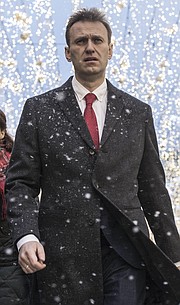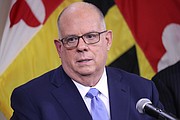With CHARLIE HARPER
A GROUP of friends had gathered for one couple’s anniversary party just outside Philadelphia. For most of the evening, the atmosphere was light and airy, and remonstrative looks from a couple of wives sufficed to suppress any tendencies to introduce America’s current fractious political scene into the discussion.
Then someone raised the subject of martyrdom. Before the discussion police could swing into gear, the flames were fanned.
“Who do we think of first when we think of martyrs?” asked Jeff, an insurance broker.
“How about Joan of Arc?” his sister-in-law Sally suggested. “Martin Luther King? Nelson Mandela?”
“I think that for the 2.4 billion Christians in the world, it’s Jesus Christ,” Sally’s husband Walt said. “I read that Christians are now 31 percent of the world’s population.”
It was hard to argue with Walt. Then close family friend Jim spoke up.
“Well, we’ve got two contemporary martyrs right now. One is acknowledged worldwide. The other one describes himself as such.”
The group quickly recognised that Walt was speaking first of Alexei Navalny, the 47-year-old Russian lawyer and dissident talisman whose death over the weekend in an Arctic Russian prison has sparked outrage all over the world.
No one outside Russian president Vladimir Putin’s inner circle believes Navalny’s death was either accidental or from natural causes. It was the result of state-committed crime, the kind of crime Russians have been most familiar with for over a century – except for the 1990s after the fall of the Soviet Union, when gang-related, property and personal assault crimes predominated.
Navalny, whose dissent had occasioned at least one previous attempt on his life with a sinister poison, returned to Moscow a couple of years ago from a medical exile in Berlin and was soon tossed in jail. He never got out. Some observers felt he knew this would happen, and had decided to allow fate and government malice to take their course. His death was a sadly predictable result, but one he doubtless hoped would spark real reform in his beloved Russia.
Dissent is tough in Russia, whether under the Tsars, Communists or the current group of plutocrats. The world’s largest nation is uniquely diffuse, and many experts have long felt that only a highly centralized, brutally harsh regime can hold together this empire of an estimated 190 different ethnicities.
It was reported recently that Navalny had compared himself to Anatoly Sharansky, a dissident 50 years ago whose continued defiance of the Soviet regime of that era made him a worldwide celebrity. Sharansky had worked for the Soviet government before speaking out against its policies, especially those forbidding emigration to certain classes of applicants.
He was the Navalny of his day – with one major exception. Sharansky was Jewish. The United States under president Jimmy Carter often displayed a strong moral streak, and this was never so prominently on display as in the case of Sharansky and other Jewish “refuseniks,” whose exit visa applications were denied for many years by the Soviet government. Carter even pulled the US team out of the 1980 Moscow Olympic Games in protest of these harsh Soviet policies.
Sharansky was a skilled publicist for his own plight, and attracted a lot of Western support. Eventually, after some harsh prison time, he was swapped for some Soviet spies in US custody in the 1980s. But his Jewishness was a vital factor in his celebrity as a dissident. And once he was allowed to leave the USSR after Mikhail Gorbachev took power, he emigrated to Israel. There, he became part of the estimated 15 percent of Israeli citizens who are Russian emigres.
Navalny enjoyed no lifeline comparable to Sharansky’s Jewish faith, though he often made reference to his relatively recent conversion to Christianity. But his persecution was strictly secular, and no particular Western support came his way due to his religious faith. One can only hope he didn’t die in vain.
The US has its own self-proclaimed martyr, as noted by Walt in the discussion above. While Donald Trump has been almost completely silent about Navalny’s death even as many other Republicans have harshly condemned it, his only notable reaction has been to compare Navalny’s martyrdom to his own “persecution” by the US federal and state criminal justice system.
“I’m a martyr for you,” he has often told his adoring supporters at rallies and in social media posts.
Putin must really hope for a second Trump presidential term. He even told Russian reporters that it might be better if Biden were re-elected in November: Putin knows how unpopular he is in the US outside Mar-a-Lago in Palm Beach. He may figure that his endorsement of Biden might actually aid Trump’s own re-election bid.
For anyone who lived through the Cold War between the US and USSR during 1945-1990, current relations between these “superpowers” must now seem so bizarre as to seem almost comical. But one veteran Cold Warrior sees no humour in the situation.
That would be Joe Biden, whose long Senate Foreign Relations Committee tenure exposed him to the seriousness and volatility of the US-USSR superpower rivalry. Biden was quick to blame Putin and his regime for Navalny’s death, and to highlight Trump’s still fawning fealty to Putin.
The US president may be many things, but he is certainly a skeptical, experienced observer of Russia and its policies. The more Trump speaks incautiously about Putin, the clearer becomes the case to vote for his opponent in November.
Republican senate prospects improve but will Trump-backers support?
Speaking of the upcoming US national elections, there have been a couple of recent political developments in Senate races that may play a significant role, though neither has attracted too much attention so far.
The first took place in the deep blue state of Maryland, where voters have supported the Republican presidential nominee only twice in the past 50 years and not at all since 1988. The state has largely been a GOP write-off in recent decades, although a couple of Republicans have been elected governor.
The most recent of those was Larry Hogan, a jolly-looking, rotund man whose genial appearance belies solid, pragmatic political skills. Hogan left office in 2022, vowing to explore a presidential candidacy to oppose Donald Trump, of whom Hogan emphatically disapproved even while serving as Maryland’s chief executive.
Hogan left office with astonishingly high approval ratings that hovered around 75 percent. Maryland voters across the political spectrum approved of his performance.
Now, Hogan has announced his candidacy for a US Senate seat that opened with the unexpected retirement of the incumbent. With the Democrats in the midst of a potentially fractious primary contest for their party nomination, this once solid blue seat is now seemingly up for grabs.
National Republicans, including Senate Minority Leader Mitch McConnell, had recruited Hogan this year, seeing a real opportunity to capture a Senate seat long held by the Democrats.
“It all kind of developed late,” McConnell said of Hogan’s campaign. “Hogan’s immensely popular. And who would have thought we could be competitive in a blue state like Maryland? But we clearly will be.”
Probably so. But it should also be noted that the Maryland Republican Party is now firmly under the control of operatives loyal to Trump. It remains to be seen how sympathetic or supportive Trump is likely to be for a candidate who has been harshly critical of him for many years, and who has committed the unpardonable sin of endorsing Nikki Haley.
The US Senate race in Montana this November was always going to be vigorously contested and closely watched as incumbent three-term Democrat Jon Tester seeks re-election in a deep red state. Tester, like his colleague Sherrod Brown in Ohio, is supposedly on the imperiled list because their states voted for Trump four years ago.
But Tester, again like Brown, is personally popular with voters for his informal manner and unpretentious accomplishments. Still, life just got tougher for Tester when the Republican field was practically winnowed down to one with the withdrawal of current Republican Congressman Matt Rosendale from the GOP Senate primary election.
Rosendale, a staunch Trumper with extreme views on several hot-button issues, might have been an easier opponent for Tester than businessman and military veteran Tim Sheehy, who was supported by the state GOP and by Trump himself.
It’s still early days, but Republican Senate prospects just got better.






Comments
Use the comment form below to begin a discussion about this content.
Sign in to comment
Or login with:
OpenID